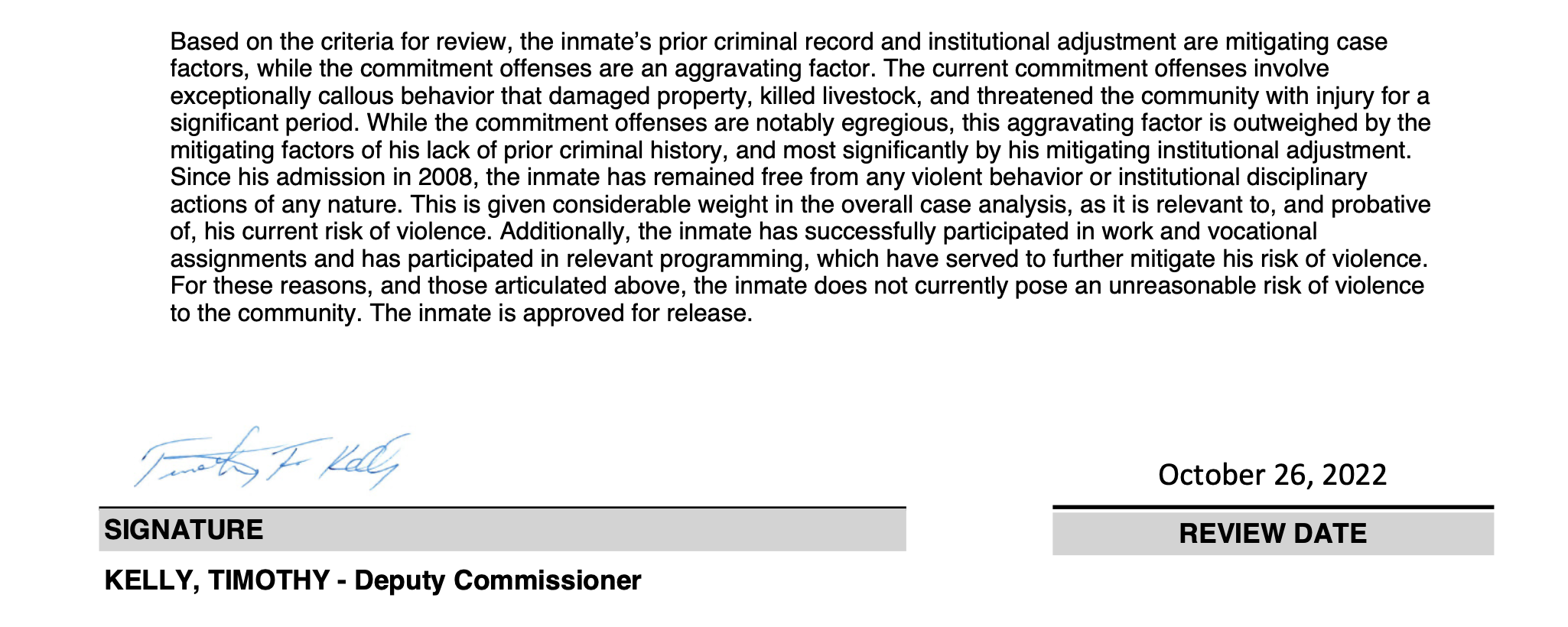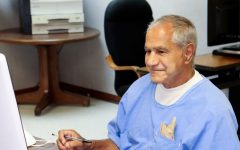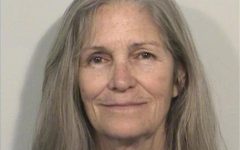
Prison Cell Bars. (Photo: Dan Henson/Shuttertock)
How Does a Convicted Serial Arsonist Get Early Parole With 1/3 Sentence Served?
California laws ‘preventing people from going to prison’
By Katy Grimes, November 15, 2022 9:51 am
Politics now trump public safety and criminal law in California, and even “prevent people from going to prison.”
With California suffering deadly and devastating wildfires every year, it is astonishing that Parole Commissioners with the California Department of Corrections and Rehabilitation have approved letting a serial arsonist out of prison early, claiming the inmate no longer poses a risk of violence or criminal activity.
Letting a serial arsonist out of prison early is comparable to letting a serial pedophile out early – they don’t change.
Robert Eason was found guilty of serial arson in 2008, for burning thousands of acres, and causing injury to a fire fighter, as well as killing more than 200 sheep with one fire. Eason has served 1/3 of his 40 year prison sentence – approximately 13 years, 11 months.
Last year, Eason was denied early release, as he has every previous year. “The inmate poses an unreasonable risk of violence and significant risk of criminal activity. The inmate is denied for release,” the parole board said.
How could Eason be denied early release for 5 consecutive years and then just be granted release? What changed?
Three “criminal justice reform” laws were passed by the Legislature and voters: Proposition 47 (2014) downgraded many felonies to misdemeanors; Proposition 57 (2016) reduced prison sentences and reclassified violent crimes as “non-violent,” and in 2011, Assembly Bill 109, Gov. Jerry Brown’s “prison realignment” scheme, shifted detainees from state prisons to local jails, overwhelming county jails. These have been a disaster for public safety, taking away the tools courts need to rehabilitate drug offenders, opening the door for rampant retail theft, and reclassifying violent crimes as “non-violent.”
Since Proposition 57 was passed in 2016 enabling early-release of “non-violent” crimes, Robert Eason has filed a request for release annually. “He has tried to get out – 2017, 2018, 2019, 2020, 2021,” Yolo County Assistant District Attorney Garrett Hamilton told the Globe. “He has been denied every time – until this year.”
Last year in a letter to the Parole Board, ADA Hamilton said Eason “only has to do 20 years of actual time towards his 40-year sentence, and we believe a serial arsonist should serve every minute of his sentence to protect California lives, property, and livestock from him.”
ADA Hamilton described Eason’s crimes in a letter to the Parole Board opposing his early release:
“Robert Eason was sentenced to 40 years in prison for a series of wild land arson fires that he set in Yolo County in 2006. All of the arson felony charges were enhanced because he lit the fires with a time delay device that caused the fires to ignite long after he was gone. These devices were made from inexpensive ‘mosquito coils’ that are readily available at any hardware store. They were designed to give him a plausible alibi, as well as to leave no evidence of cause at the area of origin. He perfected these sinister devices over the years and was able to escape arrest for many years prior to 2006. This criminal behavior, committed while he was a volunteer fireman in the same area, is evidence of a deep sociopathy that would be difficult to rehabilitate.”
Previous denials, including last years’, identify Eason’s “criminal sociopathy” going back to the late 1980’s.
ADA Hamilton told the Globe that Eason used incendiary devises to set off multiple fires or fire clusters. Some of the fires, including one in Rumsey Canyon in the Capay Valley, became huge because he set fire clusters, with four separate origins.
Cal Fire did an undercover investigation in 2006 and “nailed him on 12 fires in 4 months.” They also identified more than 150 of his fires due to the device he created for lighting the fires, Hamilton said.
It took only two sympathetic, political appointee parole board members to disregard the magnitude of his crimes, as well as all previous parole denials and allow his early release from prison.
Deputy Parole Commissioner Timothy Kelly and Assoc. Chief Deputy Daniel Moeller addressed “mitigating factors” in his assessment, such as prison work, and “rehabilitative/self-help programming.”
From the report, Kelly says, “the inmate [Eason] has the following work, vocational, and educational assignments:
WORK:
Taxi (Shuttle) Driver – 6/16/22 to present with 5778 hours.
Dining Room Worker – 4/28/22-6/15/22 with 76.75 hours.
Welder – Plant Operation 6/13/19 to 3/28/22 with over 2000 hours.
Clerk – 2/5/15 to 4/26/19 with over 5000 hours.
Porter – 7/12/14 to 2/4/15 with 649.5 hours.
The inmate was housed in out of state facilities from 7/20/2010 to 6/20/2014. Records indicate participated in work assignments during that period including, but not limited to, porter, orderly, and cart pusher.”
Eason could not have driven the prison shuttle 5778 hours in 4.5 months, even if he drove 24-hours a day. There are 744 hours in a month, 2976 hours in 4 months, and 3336 in 4.5 months, at 24 hours a day. 5778 hours, working 8 hours a day, would have been 722 days, and approximately two years of full-time driving. One year of standard full-time employment is 2080 hours.
They also acknowledged but disregarded the crimes Eason was charged and sentenced for:
“The inmate was sentenced to a total term of 40 years on the current commitment offense(s). The commitment offense(s) is/are
The inmate was convicted by jury on 10/29/2008 and sentenced on 11/26/2008 in the Yolo County Superior Court as follows:
PC 451(c) [Arson of Structure or Forest Land] for 6 years with a PC 451.1(a)(5) enhancement [Special Circumstances/ Use of Accelerant] for an additional 4 years.
PC 451(c)- (11 counts) [Arson of Structure or Forest Land] each count for 16 months consecutive with each count enhanced by PC 451.1(a)(5) [Special Circumstances/Use of Accelerant] each with 16 months consecutive.
PC 453(a) [Possession of Flammable Substances with Intent to Burn] for 8 months consecutive.
PC 453(a) [Possession of Flammable Substances with Intent to Burn] for 8 months concurrent.”
The parole board members say, “the inmate has the following rehabilitative/self-help programming:
Anger Management – 10/9/20 to 11/1/21 with 47.25 hours.
Power Up by GOGI – assigned 4/8/20 with no hours of attendance noted. LOGO Mentoring – assigned 4/8/20 with no hours of attendance noted.
Victim Awareness/Impact – assigned 4/7/20 with no hours of attendance noted. Anger Awareness/Management – 2/19/20 to 11/4/20 with 4 hours.
Prison of Peace – 12/19/19 to 4/8/20 with 16.25 hours.
Criminal Gang Members Anonymous – 8/23/19 to 4/8/20 with 49.75 hours. Bridging Program – 12/19/08 to 2/3/09 with no hours of attendance noted.
A total of 117.25 hours were spent by Eason in “rehabilitative/self-help programming;” that’s not even full-time work for one month (160-173 hours).
They conclude: “The following circumstances of the inmate’s institutional behavior, work history, and rehabilitative programming mitigate the inmate’s current risk of violence or significant criminal activity:
“The inmate has not been found guilty of institutional rules violation resulting in physical injury or threat of physical injury since his last admission to prison. As documented above, the inmate has no serious rules violation reports during this commitment. Furthermore, a record review reflects no disciplinary actions at all.”
Because Propositions 47 and 57 reclassified many violent crimes as “non-violent,” together with his prison work and rehabilitation efforts, the parole board commissioners approved Robert Eason’s parole only 13 years into his 40-year sentence.
ADA Hamilton, and many other DAs say that there is a concerning lack of transparency in the parole hearing process. The Globe reported the California District Attorneys Association has demanded that the state prison system explain why it is releasing violent prisoners who haven’t earned sufficient rehabilitation credits early from prison. To qualify for release, prisoners are supposed to earn credits for good behavior under Prop 57, but that often does not appear to be the case. In a series of reports, Julie Watts of CBS News revealed the process by which CDCR is releasing prisoners is hidden from the public, arbitrary, and dangerous.
“They’re doing it in secret because they don’t want to be called out,” El Dorado County District Attorney Vern Pierson told CBS.
“The public has a right to know what these people are doing to rehabilitate themselves,” said Yolo County District Attorney Jeff Reisig.
The parole board are political appointees, which should not matter. Public safety should always prioritize the safety of the public and victims. But now it doesn’t – political priorities have taken precedence.
Propositions 47 and 57, and AB 109 have clearly demonstrated that criminals are the priorities.
And as ADA Hamilton asked rhetorically of Gov. Newsom, “do you really want this guy getting out early?”
“If he had admitted to setting the fires and asked for help, maybe,” ADA Hamilton said. “But he had denied it all along. How do you let him out when he has denied every charge?”
The District Attorney’s Office has 30 days from the parole decision to appeal Eason’s early release. However, Hamilton said he’s concerned about their appeal because of Prop. 57’s reclassification of “violent crime.” It’s also mind boggling that serial arson is no longer considered a violent crime, Hamilton said.
If the parole board decision stands, Eason, a serial arsonist, could be released by the end of this year.

- Why is Gov. Newsom Giving $90 Million in Taxpayer Funds to Planned Parenthood? - February 17, 2026
- Rep. Kiley Requests GAO Report on Staggering Fraud in California - February 17, 2026
- ACA 7 Aims to Authorize Race Discrimination in K-12 Gifted Programs & College Financial Aid - February 17, 2026





Keep this in mind when libs claim to be “green”.
CAL FIRE does not spend almost $2,000,000 to catch just any arsonist. Eason was very prolific and acted without any conscience. He was convicted of setting two fires within a half mile of a 1995 fire where a friend and fellow volunteer FF was severly burned. As a volunteer fire fighter, he violated the public’s trust. The people of the State of California would be best served if Robert Eric Eason remained in prison for the entirety of the term to which he was sentenced.
“Green” from all the cash & material bribes that they take from their union benefactors, perhaps…
What’s more, they let the arsonists out last year during COVID and put them on busses to Mendocino County. Last summer there were fires starting everywhere from these early release arsonists. They would get picked up and sent back to prison eventually, but after they set new fires. And not just a handful of them either. There seemed to be a new fire every week at least.
“ Criminal Gang Members Anonymous – 8/23/19 to 4/8/20 with 49.75 hours.” !!! That’s more hours than his anger management attendance. And he’s in there learning from gang members – even if they’re just sharing their crimes! Why was he involved in that group? It doesn’t bode well for the public. And releasing a SERIAL ARSONIST in California?! Oh, yeah, that’s smart. ????
Get the names and information on everyone involved in this catastrophe of releasing an arsonist. California’s we need a class action lawsuit against these people Sue them for everything they own At the 1st sign of fire!!
I remember seeing the horrific front page photos in the Sac Bee showing numerous sheep, horribly burned, from one of the fires this monster set. HE IS MENTALLY DERANGED AND HAS NO BUSINESS BEING RELEASED IN CIVILIZED SOCIETY! Californians need to take responsibility for the legislation that is introduced and passed in this god-forsaken state. The recent propositions passed that drastically change criminal laws, etc., are the direct result of citizens NOT taking their responsibilities seriously. You can no longer rely on government to protect us. They’re doing just the opposite. The America we knew and loved is quickly disappearing due to radical pro-criminal progressives. Just remember, what you vote for is what you get!!!